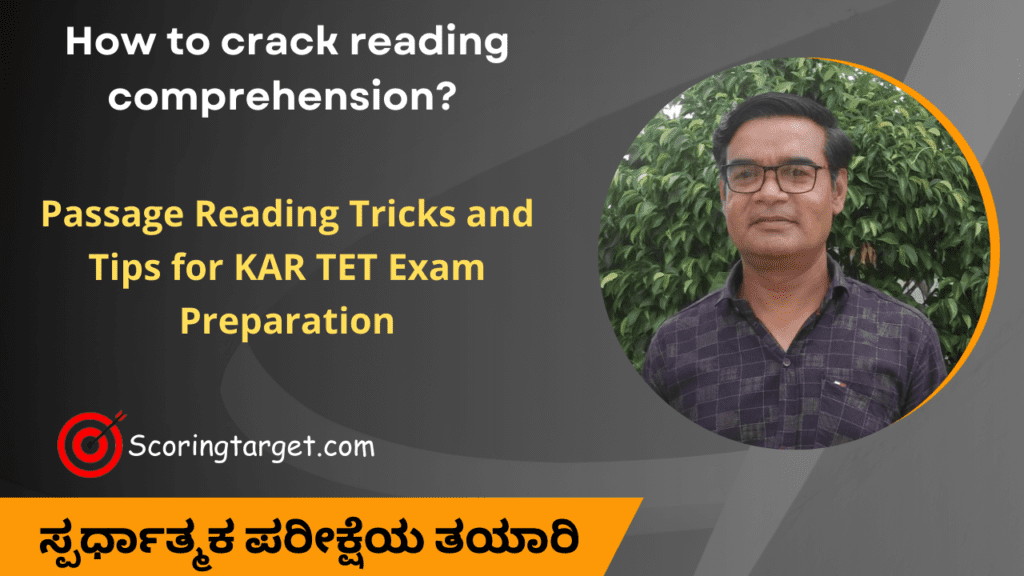KARTET questions and answers Part 3. Previous year questions and answer of KAR TET exam. Passage reading notes for CTET.
How to crack reading comprehension? Reading Comprehension Tricks and Tips for KAR TET Exam Preparation
Reading Comprehension in the Karnataka State Teacher Eligibility Examination (KARTET) assesses the candidate’s ability to understand and interpret information from a given piece of text, either a poem or a paragraph.
To get more video notes for KAR TET exam preparation notes, visit our YouTube channel. This channel is very useful for CTET exam preparation.

Reading comprehension passages with questions and answers
How to crack Reading Comprehension?
Tricks and tips to prepare reading comprehension for KAR TET exam preparation
Reading Comprehension in the Karnataka Teacher Eligibility Test (KARTET) assesses a candidate’s ability to understand and interpret information from a given passage, which can be either a poem or a paragraph. Here’s a breakdown of what you might encounter in a KARTET reading comprehension section worth 8 marks:
- Enhance your reading comprehension skills with our comprehensive guide designed specifically for KAR TET exam preparation.
- Packed with valuable tricks and tips, this resource will help you navigate through complex passages and answer questions with confidence.
- Whether you are a beginner or an experienced test-taker, our guide offers strategies to improve your understanding of written texts and boost your overall performance.
- With a focus on key concepts and effective reading techniques, this product is an essential tool for anyone looking to excel in the KAR TET exam.
Structure of the Comprehension Section
1. Length and Format:
The reading comprehension section consists of an unseen passage, which can be either prose or poetry. The length of the passage varies, but it generally spans a few paragraphs for prose and a few stanzas for poetry.
2. Question Types:
Questions based on the passage can range from direct to inferential. Common types include:
3. Literal Comprehension:
These questions ask about specific details or facts stated explicitly in the passage.
4. Inferential Comprehension:
These require you to read between the lines, drawing conclusions or making interpretations based on hints or implicit information in the passage.
5. Vocabulary in Context:
You may be asked to determine the meaning of a word or phrase based on how it’s used in the passage.
English passage reading for gpstr exams
6. Summarization or Main Idea:
These questions focus on identifying the main theme or central idea of the passage.
7. Author’s Purpose or Tone:
These questions assess your understanding of why the author wrote the passage or the overall attitude conveyed.
Approach to Answering the Questions
1. Read Carefully:
Start by reading the passage thoroughly to get a sense of its overall theme and context. Make sure you understand the key points.
2. Identify Key Details:
Note important facts, dates, names, or events that might be relevant to the questions.
3. Understand Context:
For vocabulary questions, use context clues from the surrounding text to deduce meanings.
4. Analyze and Interpret:
For inferential questions, consider what the passage suggests or implies without directly stating. Think about the implications of the text.
5. Answering the Questions:
Read each question carefully. Refer back to the passage to find evidence for your answers. Avoid jumping to conclusions not supported by the text.
Preparation Tips
1. Practice Regularly:
Engage in regular reading exercises with different types of texts (prose and poetry) to become comfortable with various styles and themes.
2. Work on Vocabulary:
Enhance your vocabulary to be better equipped for context-based questions.
3. Develop Critical Thinking Skills:
Practice drawing inferences and interpreting the underlying meanings of passages.
4. Simulate Exam Conditions:
Take practice tests to get accustomed to the format and time constraints.
Overall, the reading comprehension section tests your ability to understand and analyze written text, which is an essential skill for educators. Being well-prepared with a good reading strategy and regular practice will help you perform well in this section.
Important link for KARTET / GPSTR exam preparation
1. KAR TET study material (Videos)
Passage reading,unseen passage for kartet paper 1 and paper 2
Watch this video for the explanation of KARTET questions and answers Part 3.
“Are you gearing up for the Karnataka Teacher Eligibility Test (KARTET)?
Our channel is here to help you ace the exam! We offer expert insights, study tips, and practice questions to guide you through each step of your preparation.
From exam pattern breakdowns to key topics in education, we’ve got you covered. Subscribe and join us for a comprehensive journey toward KARTET success!”
